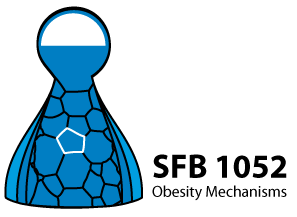School of Obesity Mechanisms
Scientific modules
Cloning Club
This seminar introduces students to routine methods as well as novel techniques in molecular biology. It focuses on both the theoretical background and practical considerations in modern molecular cloning techniques. The aim of the course is to enable students to successfully apply and optimize cloning techniques in their projects.
Protein Expression, Purification and Characterization
This course will introduce modern techniques of recombinant expression and purification of proteins, including expression in E.coli as well as eukaryotic expression systems. Special attention will be given to adipocytokines. Analysis will include spectroscopic methods (mass spectrometry, 3D structure analysis methods) and cell based signalling tools.
Animal Models in Obesity
The course will familiarize students with the generation and characterization of gene-deficient mouse lines. Knock-out strategies, consequences of deletion as well as histological, immunohistological studies and metabolic phenotyping in the context of obesity (e.g. hyperinsulinemic clamps, movement radar, calorimetry) will be topics.
Methods in Genomics
The module provides doctoral researchers with knowledge about methods to study the genetic evolutionary history of modern humans with genomic approaches and how to localize regions that have been under selection in recent human history. This will include genome-wide association studies as well as population genetics. This course will also provide the basics of QTL, eQTL and RNAseq approaches illustrated by examples. Database mining/usage of public resources will be part of this module.
Social and Psychological Aspects of Obesity
Since psychological and social aspects have a very important influence on the development and treatment of obesity, this module will familiarize students with current research in this field such as psychological studies and functional magnet resonance imaging.
Clinical Basis of Obesity
This module serves as an introduction to current problems and challenges of obesity management as seen in Dermatology, Endocrinology, Pediatrics and Cardiology. Lectures and case presentations will provide doctoral students in natural sciences as well as medical students with comprehensive medical background information on obesity.
Biomarkers in Obesity
The number of biomarkers related to obesity and to associated diseases is still growing. This module will provide information on current laboratory chemistry, analytic methods, metabolic profiling and diagnostic strategies.
Special Aspects in Obesity
There is growing evidence that the immune and neural systems interact with fat tissue under physiological but also pathophysiological conditions. Several skin diseases are linked to obesity, fat tissue is intensively innervated and autoimmune reaction influence the fate of adipose tissue. Those issues will be present highlighting facts of fat tissue (function) additionally energy storage. Adipose tissue histology and histochemistry will be a major focus.
Therapeutics Targeting Obesity
This course will give an overview of the research for drug targets and drug development in obesity and related diseases. Therapeutic strategies including surgery intervention will be discussed.
Principles of Clinical Studies
The module will familiarize doctoral students with the design and conduction of clinical studies including legal regulations. Studies in clinical physiology (clamps, fMRI, oGTT, behavioural task) will be carried out together with IRTG students.
Statistics and Bioinformatics
Besides the acquisition of scientific data, their correct analysis and interpretation is essential. This module will teach basic statistical considerations and methods which are applied in daily experimental as well as clinical practice.

